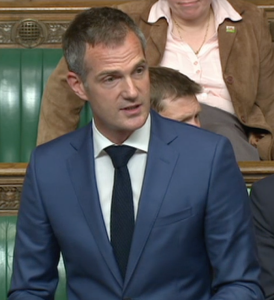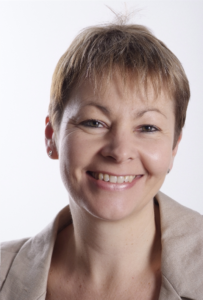Hove MP Peter Kyle drew on his experiences as an aid worker during contributions to the continuing debate in the House of Commons about the refugee crisis.
This week he intervened when the Home Secretary Theresa May made a statement to the Commons about the government’s response to the situation.
The Labour MP said on Wednesday (16 September): “From my experience of working in a previous refugee crisis, I know that the UNHCR (United Nations High Commissioner for Refugees) is one of the most overstretched and underfunded of UN organisations.

“Now that the government are relying so heavily on the UNHCR to help them with this crisis, can the Home Secretary assure us that it is adequately resourced and that British officials are working alongside in situ?”
Mrs May replied: “Yes. That is exactly one of the issues that I discussed with António Guterres (the High Commissioner) when I saw him on Monday.
“We stand ready to provide support, probably in the form of personnel who can help to bolster the UNHCR effort to the extent that it requires.
“He already has plans for refocusing some of its effort to ensure that such support can be provided but if further support is needed in the form of people in situ, we stand ready to provide it.”
He also intervened during a speech ten days ago by Yvette Cooper, who was then the Shadow Home Secretary.
Desperate
Mr Kyle said during an emergency debate on the refugee crisis in Europe: “I was an aid worker in the Balkans for almost 10 years during the crisis in the 1990s and I saw at first hand what it took to make somebody leave their home, their loved ones and the community they love.
“People do not flee such things lightly. They do so because of desperate conditions and war.
“Does my right honourable friend agree that those conditions and the push away from areas of war far outweigh the pull of coming to a country such as Britain?”
She agreed.
A day later Mr Kyle took part in an opposition day debate – on the humanitarian crisis in the Mediterranean and Europe – initiated by the Scottish National Party (SNP).
He said: “I thank the honourable member for Edinburgh East (Tommy Sheppard) for his speech. I share his passion and was very moved by how he spoke with personal commitment about the plight of individuals.
“Many of his colleagues have spoken with great humility and humanity about the personal challenges faced by migrants.
“I commend the SNP for calling this debate and for allowing enough time for a detailed discussion.
Plight
“I also pay tribute to the International Development Secretary. Although we disagree on many issues, including the key issue of the number of people allowed into this country, she spoke with great warmth and insight about not only the individuals she has met when visiting refugee camps, but the plight of those in crisis.
“This crisis has at its core two huge challenges: war and mass migration.
“War is chaotic and unpredictable, and mass migration has brought these challenges to our doorstep.
“As we have seen, this is also a time when the best and the worst of humanity are on display.
“I was an aid worker in the Balkans and eastern Europe throughout the 1990s and in that time I saw a lot of places impacted by war and refugee crises.
“I worked in Albania from 1992, which was years before the refugee crisis, and got to see at first hand a country being impacted by refugees when the Kosovan war broke out.
“I worked in a town called Korçë in southern Albania. In the late 1990s, when people started fleeing the murderous intentions of Slobodan Miloševic, the town took in 50,000 refugees in a single night.
“The population of the entire town was doubled overnight and we took part in the operation that cared for those people.
Extraordinary
“It was extraordinary not only that the host town, in one of the poorest countries on our continent, responded with extreme generosity, but that the international community supported it in that endeavour.
“It was also interesting to see how the next-door country, Macedonia, responded very differently.
“We have seen how different countries on our continent have responded differently over time.
“I do not want to talk in detail about those experiences, other than to point out a few lessons from my time dealing with refugees and humanitarian crises up close.
“The first issue that I would like to raise with ministers is the role of the UNHCR. In my experience, the UNHCR is one of the most underfunded and overstretched humanitarian organisations, certainly within the United Nations.
“In one crisis that I worked in, it took three weeks before the UNHCR was capable even of deploying staff to an area that had received 50,000 refugees in a single night.
“When the staff did arrive, they were few in number and it took time to build the resources to get an operation up and running.
“The government are placing most of the responsibility on the UNHCR to co-ordinate the refugees who will come to the United Kingdom.
Opportunity
“I would like assurances that the government are ensuring that the UNHCR has the right resources behind it to carry out that function with enough diligence and to make it an effective operation.
“The government are relying on the UNHCR to sift the people who will come here … this is a good opportunity for the government to reassure the House that the UNHCR has the resources to carry out the sifting in the right way.
“That process is incredibly important. My experiences are a little out of date so I cannot talk about how the UNHCR operates today but, based on those experiences, I think that it is cause for concern and something that the House needs to be reassured about.
“The second issue I want to raise is the population that remains behind. When sifting happens in a refugee population, it is quite often the people with skills who are taken first.
“Sometimes, the population that will be left is not given due consideration.
“In a camp of 5,000 or 10,000 people – or even more, as is sometimes the case in the current situation – it is important that the population that remains after a sifting process has all the skills that any population needs, even more so considering that they are living in encampments that have very basic conditions.
“I hope the minister can reassure the House that the UNHCR is being encouraged, on behalf of the British government, to give due consideration to the population that remains.
“The spotlight is on the generosity of the British people because this crisis is unfolding on British soil. That brings aid work closer to home than it usually is.
Challenging
“This crisis is challenging both abroad and at home. I do not see this as a zero-sum game.
“When we have said that not enough people are being welcomed to these shores, some people, particularly on the government benches, have pointed out that money is being given abroad.
“It should not be an either/or situation. The fact that we are being generous abroad should not stop us being generous at home.”
A fellow Labour MP, Susan Elan Jones, who represents Clwyd South, intervened. She said: “My honourable friend is making an impassioned speech, drawing on his great expertise.
“Does he agree that one striking thing about this crisis is the number of people from different sorts of communities right across the country who are being supportive?
“That is happening not just in the big multicultural cities but in small towns and villages.
“There is a massive response across our country.”
Mr Kyle said: “It highlights just how much generosity there is within the British public at the moment and that should be absolutely commended.
Support
“At a time when anybody can get into their car to deliver aid to people in need, we must ensure that this is done in a structured way.

“I encourage people who are tempted to do this to co-ordinate with humanitarian organisations that have experience because people who are fleeing war do not just need the clothing that is on offer.
“That is incredibly important but many will need specialist emotional support too. We need to make sure that they get access to both.
“Brighton and Hove, the city I represent, has that generosity in abundance. The council is preparing to take five families, which is a modest contribution but it is what is being asked of it at the moment.
“It is also making contingency plans to take many more. We will rise to the challenge.
“The honourable member for Brighton Pavilion (Caroline Lucas) is in her place and I am sure that she, like me, has been inundated with offers from the general public to take people into their homes.
“That is symptomatic of the huge generosity that exists in the population at the moment and I pay tribute to their humanity and generosity.
“We must also accept that this situation could be here for the long term. Many people will have emotional damage and will need specialist care.
Powerful
“People who are offering to take people into their homes need to be cognisant of that and make sure that they are equipped to give the care that is needed into the long term.”
Caroline Lucas said: “The honourable gentleman is making a powerful case.
“He referred to Brighton and Hove, the city we both represent, rightly saying that many people there want to help.
“Does he agree that we need to put more pressure on the government for the funding, particularly for local authorities, and for them to guarantee that it will last beyond the one year?
“I am really concerned that one year is not enough.”
Mr Kyle said: “I certainly share the honourable lady’s concerns and she makes a pertinent point.
“It is incredibly important that when the Department for International Development funding runs out, councils get the commitment into the long term, in order to continue their efforts.
“I have seen what it takes to make somebody leave their home, their community and the people they love – they do not do that lightly. The push of war is greater than the pull of Britain.
Crisis
“This crisis involves hundreds of thousands of people. It is into the millions now.
“When there is a crisis involving that number of people, we can find in that population anything we like because every ounce of human characteristics will be on display.
“People who look for criminality will find it and people who look for economic migrants will find them.
“The job of this House is to take decisions in the round and see that, overall, this group of people need help, are fleeing their country because of war and are turning to us for help in all sincerity.
“We can argue about numbers but there is one basic question: are we doing all we can as a nation on our own soil or is there more we can do?
“There are more people who need to come here, the British people are prepared to take more and it is the government who are getting in the way.”
Concern
Earlier in the same debate Caroline Lucas praised an SNP MP – Angus Robertson – while raising her concern about the short-term funding being offered to councils that take refugees.
The Green MP said: “I commend the honourable gentleman and his party for the inclusive way in which he is conducting this debate and the drafting of the motion.
“He rightly talks about the upwelling of public concern about and the will to do more.
“Does he agree that local authorities should be helped with funding beyond the first year?
“Many local authorities across the country want to do more but they need to know that there is more than just one year of funding.”
Perhaps unsurprisingly, Mr Robertson agreed, saying that she had made a sensible point.








As someone who studied social anthropology at Sussex Unversity, I am seeing a very serious need for the Govt and local authority to tap into this area of expertise.
SOAS in London and AFRAS within Sussex University need to be on board as advisors along with relevant other universities with this expertise.
There will be anthropology graduates in this city who may be best suited to take in refugees (if offering)who will be sensitive to the differences and cultural issues that MUST be addressed. The religious leaders MUST step up to the plate – especially those within the Muslim faith’s factions, if Muslim refugees come here.
We have a significant Middle Eastern population within this city and they need to be drafted in to make themselves part of the story.
I have met refugees who were professionals in their own country whose credentials are not recognised here so they could not continue in those professions. They drive taxis. Some of these emigre people need to be pulled out of the woodwork and given roles too.
Helping these people to fit in comes AFTER all this because they need to be stabilised first and foremost.